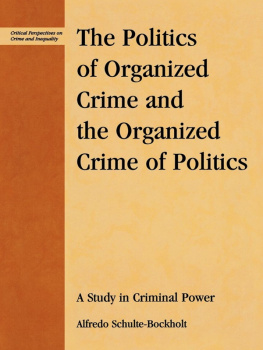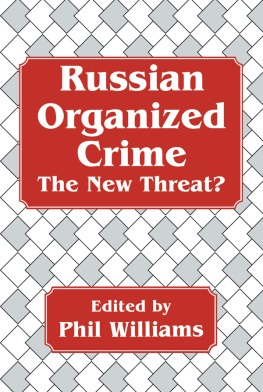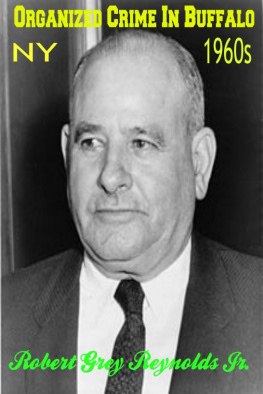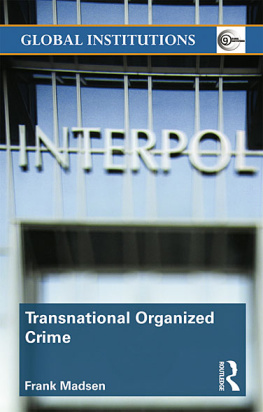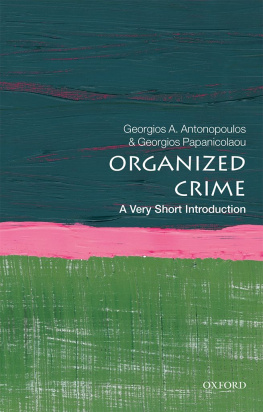First published 1992 by Transaction Publishers
Published 2017 by Routledge
2 Park Square, Milton Park, Abingdon, Oxon 0X14 4RN
711 Third Avenue, New York, NY 10017, USA
Routledge is an imprint of the Taylor & Francis Group, an informa business
Copyright 1992 by Taylor & Francis.
All rights reserved. No part of this book may be reprinted or reproduced or utilised in any form or by any electronic, mechanical, or other means, now known or hereafter invented, including photocopying and recording, or in any information storage or retrieval system, without permission in writing from the publishers.
Notice:
Product or corporate names may be trademarks or registered trademarks, and are used only for identification and explanation without intent to infringe.
Library of Congress Catalog Number: 91-28923
Library of Congress Cataloging-in-Publication Data
OKane, James M.
The crooked ladder: gangsters, ethnicity, and the American dream / James M. OKane.
p. cm.
Includes bibliographical references and index.
ISBN 0-7658-0994-X (alk. paper)
1. CriminalsUnited StatesHistory. 2. MinoritiesUnited States History. 3. United StatesEthnic relations. 4. Organized crime United StatesHistory. I. Title.
HV6197U5043 1992
364.1060973dc20
91-28923
CIP
ISBN 13: 978-0-7658-0994-0 (pbk)
To my wife, Marge,
and my children,
J.B., Dan, Pat, Joe, and
Mary Rose
Want is not the sole incentive to crime. Men also
wish to enjoy themselves and not be in a state of
desirethey wish to cure some desire going beyond
necessities of life, which preys upon them... and
therefore they commit crime.
Aristotle, Politics
Im telling you... Joxer... th whole worls...
in a terr... ible state o... chassis.
Captain Boyle, in Sean OCaseys
Juno and the Paycock
I wish to record my sincere appreciation to the many people who have assisted me in completing this book.
Special thanks goes to my wife Marge, and my childrenJ.B., Dan, Pat, Joe, and Mary Rosewho patiently endured my supper-time monologues on Dutch Schultz, Chinese tong violence, crack homicides, Irish rebel ballads, Prohibition, and other diverse topics touched upon in this book. Im grateful to my mother, Matilda OKane, and to my sisters, Helen Grubbs and Bernadette Moran, who alerted me to our familys immigrant heritage and to the part crime and ethnicity played in the communities in Brooklyn where we had lived and matured. Without this personal background I probably never would have been interested in the relationship between ethnic crime and upward social mobility.
To my collegues at Drew University I also owe a special debt. My two tertulia comradesTom Oden and John Ollomwho constantly encouraged me in this labor of love as they read chapters, critiqued them, and offered constructive advice. So also did Phil Jensen, Jim Mills, Al Lee, David Cowell, George de Stevens, Jonathan Reader, and Lydia Ledeen. Each helped me to focus my arguments as each analyzed various parts of the work and supplied generous suggestions as to how I could better state my thesis. Other Drew collegues assisted me by providing pertinent information when I needed it. Here I would like to acknowledge Neal Riemer, John Copeland, Paul Wice, Kathy Gray, Roxanne Friedenfels, Luiz Barbosa, Hans Morsink, Mike Meagher, Evelyn Meyer, Roger Wescott, Rebecca Hodgkins and Jean Marie Madorran. So also did my brother-in-law, James Gray, of American University.
Those receiving special thanks should also include my dean, Paolo Cucchi, who made possible the support services necessary, and Mitzi Pappas, Lois Conant, Sue Bennett, Lydia Feldman, Jean Ruch, and Paula Massa who endured tedious hours at their word processors typing various versions of the manuscript. Without their assistance, there literally would be no book.
Im grateful to others who never read any of the manuscript but whose ideas permeate my thesis. I would single out Will Herberg, now deceased, who had been a collegue of mine at Drew University; over many a cup of coffee we debated the topics of ethnic crime and subsequent mobility. Richard Cloward of Columbia University also deserves special mention, for he was the first professor I encountered who alerted me to the manner in which ethnic groups really make it in American life.
To the members of various law enforcement departments I also express my gratitude. Special thanks go to Jack Hughes, a close friend and a former sergeant of the New York City Police Department who opened my sociological eyes to the realities of urban crime. Without him, my views on crime would still be text book oriented, devoid of any real connection to the actualities of crimes. Other NYPD detectives, both retired and active, who worked in the Brooklyn and Queens NYPD homicide divisionsPaul Weidenbaum, Al Cachie, Bob Alongi, Mike Fella, Lenny Ayers, Joe Titus, Lou Savarese, Bob Gabrielas well as Brooklyn Norths Robbery Investigating Programs Rich Conforte, and Bob Creighton, the chief investigator for the district attorneys office of Suffolk County, New York, alerted me to current trends in organized crime and continued tutoring me in what really goes on in the streets. Finally, I would like to acknowledge the late Manny Ayers, Drew Universitys past security department head and former police chief of Leonia, New Jersey, who further assisted in formulating my ideas about criminal careers, as did my brother-in-law, Tom Moran, of the Palm Beach, Florida, police department. Without the generous input of all of these dedicated police officers I would still be in the ivory tower of sociological theorizing.
Also, I would like to thank Jean Hutson of the Schomburg Center for Research in Black Culture for her assistance in helping me with background documentation. Finally, I would like to thank those friends connected neither with academia nor law enforcement who assisted me with their ideas, and advice as well as critical reviews of rough drafts of various chapters of the manuscript. These include Steve Huvane, who critiqued the entire book, as well as George S. Johnston, Addie Mae Kelly, John Caporasa, and Rafael Francia who assisted me with their insights.
To all of the above, I am deeply endebted.
Introduction
This book represents an attempt to describe how ethnic minorities coming to Americas shores and cities have utilized organized crime as one vehicle of upward mobility, removing themselves from lower-class status, advancing to middle-class power and respectability.
Ethnic organized crime has largely been ignored by social scientists and historians alike. The phenomenon constitutes the dust of American social history, a curious footnote in the odyssey of ethnic and racial minorities seeking to make it, a subject not to be taken too seriously by those researching the mobility patterns of either their own ethnic ancestors, or current minority newcomers.
But those of us from such ethnic backgrounds know better, for our lives have witnessed the salience and resilience of organized crime in lower-income and working-class communities. The ethnic gangster constitutes a ubiquitous fixture in such communities andcontrary to the often distorted media presentationshe often is admired by many, his actions emulated and romanticized by his ethnic brethren. Were the bookie, the loan shark, the racketeer, the bootlegger, the vice lord, the crack dealer, the prostitute, and pimp truly despised and hated by the communities in which they flourish, they would have disappeared long ago, for the public would have no interest in, or need for, their services. Historically, such has not been the case nor is it currently the case, for communities are in fact ambivalent towards their ethnic gangsters, fearing them and supporting them simultaneously.


